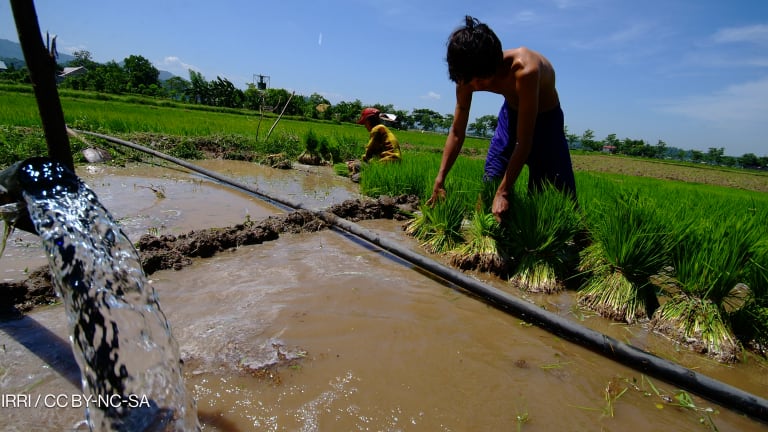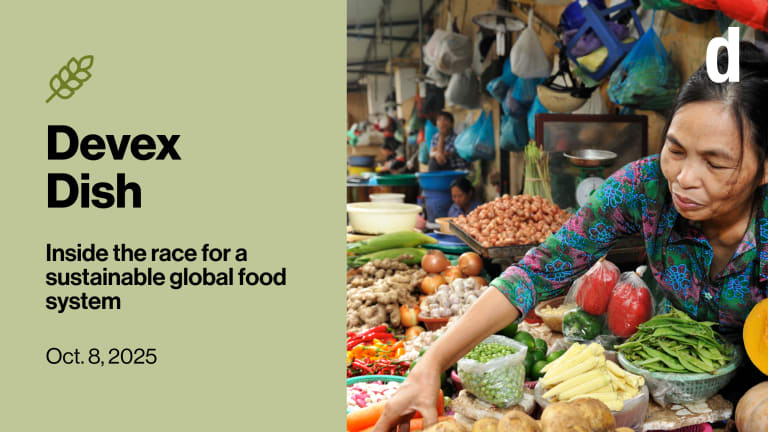
CANBERRA — Feeding the world in a changing environment will require major shifts in government policy to incentivize low-carbon and environmentally friendly agricultural solutions. It will also require change on the demand side, with consumers needing to alter their eating habits to fall more in line with nutrition guidelines recommended by the World Health Organization.
At the 2019 Crawford Fund Annual Conference in Canberra this week, speakers were optimistic about the impact that changes in technology, science, and agricultural practices could have on sustainable food production. But the external factors of politics and consumerism were seen as the biggest risks.
“We need a green revolution again,” Charles Godfray, director of Oxford Martin School, told the audience. “And the revolution has to be not only on the supply side as the industrial revolution and the green revolution was, but also on the consumption and demand side.”
The challenge of changing human habits
“With business as usual we expect greenhouse gas emissions to increase by about 50% by mid-century,” Godfray told the audience in his keynote address. “Just making a dietary shift … means that the increase goes from 50% down to 7%.”
While a dietary shift that is consistent with recommended nutrition guidelines is still nowhere enough to put the planet within stable climate limits, Godfray said it can go a long way, and could also have health and economic benefits through reduced health care costs and a more productive workforce.
Studies on how to reduce the climate impact of food production have looked at reducing waste, increasing investment in technology, and changing diet. But “if we care about reducing the effects of agriculture on greenhouse gas emissions, the single thing we really need to do is to think about diet change,” he said.
While consumer shifts are happening — including an increase in meat-free protein alternatives — human nature may be the biggest barrier to progress, speakers suggested.
“Trying to convince the global north that they need to reduce their share with human nature being as such, I don’t think it will ever happen unless it is forced,” Sarah Barker, special counsel for climate risk governance with legal firm Minter Ellison, warned.
Policies and incentives to build change
Incentivizing changing agricultural practices was also identified as an important strategy.
Bruce Campbell, program director for the CGIAR Research Program on Climate Change, Agriculture and Food Security, presented insights from a 2018 study that showed less than 20% of small-scale farmers in Africa, Asia, and Latin America were “stepping-up” on their agricultural investments.
Uncertainty around environmental conditions and markets mean farmers are questioning whether to take a risk on new crops — and without an income, Campbell said they are unlikely to invest in new approaches that would improve yield and reduce environmental impact.
Through incentives, Campbell hopes this could change. In Kenya, insurance for farmers that can be purchased using a mobile phone when buying seeds means they have a backup if crops fail. And in Ghana 300,000 farmers are paying for climate advice to improve their ability to prepare and respond to changing environmental conditions.

So far, 650,000 farmers in sub-Saharan Africa have received insurance to support agricultural production. But Campbell said to make an impact on food production and the environment, this needs to reach tens of millions of farmers. “None of this will happen without the right policies and institutions,” Campbell warned.
Ajay Mathur, director-general of The Energy and Resources Institute, also discussed the critical need to incentivize sustainable practices.
In India, the green revolution was incentivized in part by charging nothing for electricity used to pump water onto crops. But this led to overwatering and increasing emissions.
Using renewable energy to pump water as well as to support other functions could help, Mathur said, suggesting a solar power model where farmers have the option to sell energy back into a local grid and would therefore question whether they should pump more water or sell energy to their neighbors.
“What it needs is the right business models, and the right kinds of loans that banks can provide,” he said. “It’s not a matter of subsidies, it’s a matter or re-orienting financial flows into this sector.”
But a business model still needs to be developed to make solar power and renewable energy the more viable solution for farmers.
Developing tailored policies and incentives for farmers
Jim Woodhill, food systems advisor for the Sustainable Development Investment Portfolio with the Australian Department of Foreign Affairs and Trade, explained that on current trajectories demand for food globally will be up 70% by 2050. This means a 28% increase in demand for water, and a 38% increase in demand for energy.
This is not sustainable, but the “less than adequate” interface between science and policy means the framework is not in place to build the incentives required to support a reduction in the environmental impact and emissions created by agricultural production.
Any incentives and policies need to target specific sub-groups of farmers — especially small-scale farmers — and not just treat them as one group, Woodhill added.
“We’ve heard a lot about small-scale farmers,” he said. “The next decade is going to need fundamental transformation of small-scale agriculture to meet some of the environmental and social issues we need to address.”
“But there are different scales, different sizes, men, women, and different geographic locations. So we have to start disaggregating who we are talking about when we use the term ‘small-scale farmers’ to understand what sort of incentives are going to drive who to change practices.”








